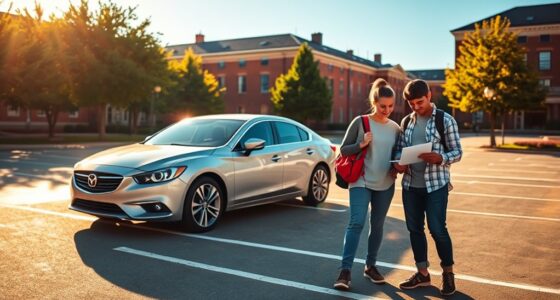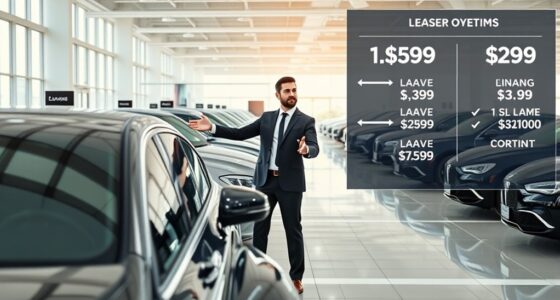People choose to lease cars because it appeals to your desire for flexibility, status, and access to the latest models without long-term commitments. Leasing taps into your subconscious preferences, like wanting to stay trendy and avoid depreciation worries. Emotional and social influences also play a role, making leasing feel like a smart, modern choice. If you want to understand how these psychological factors shape your leasing decisions, there’s more to uncover below.
Key Takeaways
- Leasing appeals to the desire for flexibility, access to new models, and avoiding depreciation concerns.
- Psychological biases, like optimism and framing effects, make leasing seem more advantageous and risk-free.
- Social status and lifestyle signals associated with leasing influence consumer preferences and perceptions.
- Emotional responses and subconscious influences promote leasing as a modern, convenient, and status-enhancing choice.
- Personality traits, such as risk tolerance, shape individual inclinations toward leasing over ownership.

Have you ever wondered what influences your leasing decisions beyond just numbers and terms? It’s not solely about the monthly payments or the duration of the lease; there’s a deeper layer rooted in lease psychology and consumer behavior. When you consider leasing a car, your choices are shaped by emotional responses, perceptions, and subconscious influences that go beyond plain facts. Understanding this can help you recognize why you might prefer leasing over buying, even if the financials seem similar.
Lease psychology plays a significant role because it taps into how you perceive value and risk. Leasing often feels less intimidating because it offers flexibility and lower upfront costs, which align with your desire for convenience and lowered commitment. Your consumer behavior is influenced by how you view ownership versus access. Many people don’t see leasing as giving up ownership but as gaining access to the latest models and technology without long-term financial obligations. This perspective makes leasing appealing, especially if you prize keeping up with trends or want to avoid the hassles of depreciation and resale.
Your decision-making process is also affected by social and emotional factors. For instance, if you associate leasing with modernity, status, or smart financial management, you might be more inclined to choose it. The way you perceive leasing in relation to your lifestyle, social image, or even peer influence impacts your consumer behavior. Marketing strategies often appeal to these psychological cues, emphasizing the benefits of leasing—such as driving a new car every few years or avoiding costly repairs—rather than focusing solely on the numbers.
Furthermore, your lease psychology can be influenced by cognitive biases. For example, the optimism bias might lead you to underestimate potential costs or overestimate the benefits, making leasing seem like the smarter choice. The framing effect also plays a part—if leasing is presented as a simple, risk-free option, you’ll likely feel more confident in that decision. These psychological factors make leasing an attractive option because they align with your subconscious desire for control, flexibility, and minimizing future uncertainties.
Additionally, understanding personality traits such as risk tolerance or social influences can help explain why some individuals are more inclined to lease rather than buy. Ultimately, your consumer behavior around leasing isn’t just about the practical aspects; it’s about how you perceive and emotionally respond to the leasing process. Recognizing these influences can help you make more informed choices, understanding that your preferences are shaped by a complex interplay of psychological and emotional factors—beyond just the numbers on a contract.
Frequently Asked Questions
How Does Leasing Affect Long-Term Financial Planning?
Leasing can complicate your long-term financial planning because it often leads to continuous payments without building equity. The leasing psychology might make you feel flexible, but it can also cause ongoing expenses that limit savings or investment opportunities. You should consider how lease payments fit into your budget and goals, ensuring they don’t hinder your future financial stability. Staying aware of these impacts helps you make smarter, more balanced financial decisions.
Do Personality Traits Influence Leasing Preferences?
Personality traits definitely sway your leasing preferences, acting as a compass guiding your choices. If you’re adventurous and value flexibility, leasing tends to appeal to your sense of freedom, showcasing personality compatibility with short-term commitments. Conversely, those who seek stability might prefer buying. Your leasing tendencies mirror your inner values, making your personality a key player in determining whether you lean toward leasing or owning—it’s all about aligning choices with who you are.
What Emotional Factors Drive the Decision to Lease Rather Than Buy?
You might lease a car because of lease anxiety—you prefer the peace of mind that comes with lower payments and fewer long-term commitments. Brand loyalty also plays a role, as you trust certain brands and want to stay within that familiar experience. These emotional factors make leasing appealing, offering you reassurance and consistency, which helps you feel more in control and satisfied with your decision.
How Does Peer Influence Impact Leasing Choices?
Like Icarus reaching for the sun, you might feel peer influence pulling you toward leasing decisions. Peer pressure and social conformity often shape your choices, making leasing seem more appealing to fit in or impress others. You may worry about status or appearances, aligning your vehicle with peer expectations. This social pressure nudges you toward leasing, not just for practicality but to maintain your image within your social circle.
Are There Psychological Benefits to Leasing Over Ownership?
Yes, leasing can boost your lease satisfaction because it offers a sense of novelty and flexibility, reducing the attachment you might feel toward ownership. You don’t have to worry about long-term maintenance or depreciation, which can lessen ownership attachment. This temporary commitment helps you enjoy the latest models without the stress of ownership, making your driving experience more enjoyable and satisfying.
Conclusion
Just like a fleeting summer breeze, leasing offers you the freedom to enjoy new cars without long-term commitment. By understanding your motivations—whether it’s desire for variety, financial flexibility, or avoiding hassle—you gain insight into your own driving choices. Remember, you’re the captain steering your vehicle of preference. So, next time you consider leasing, think of it as your personal voyage—an adventure shaped by your desires, much like Odysseus charting uncharted waters.










